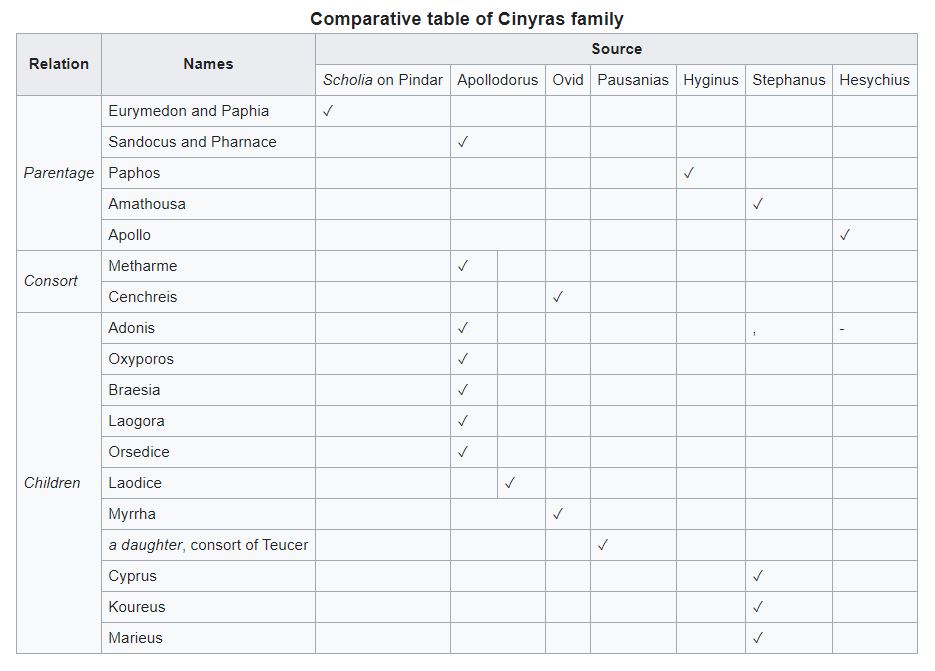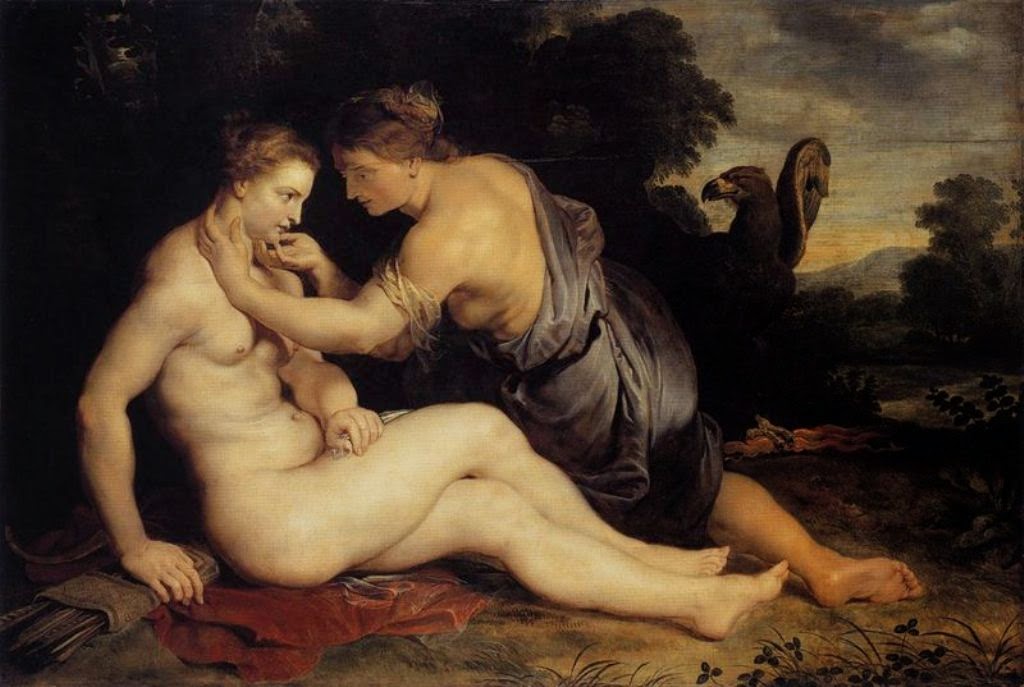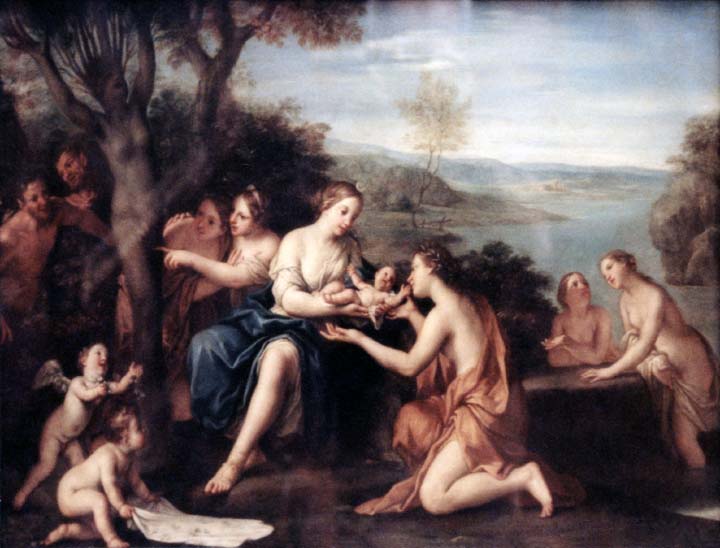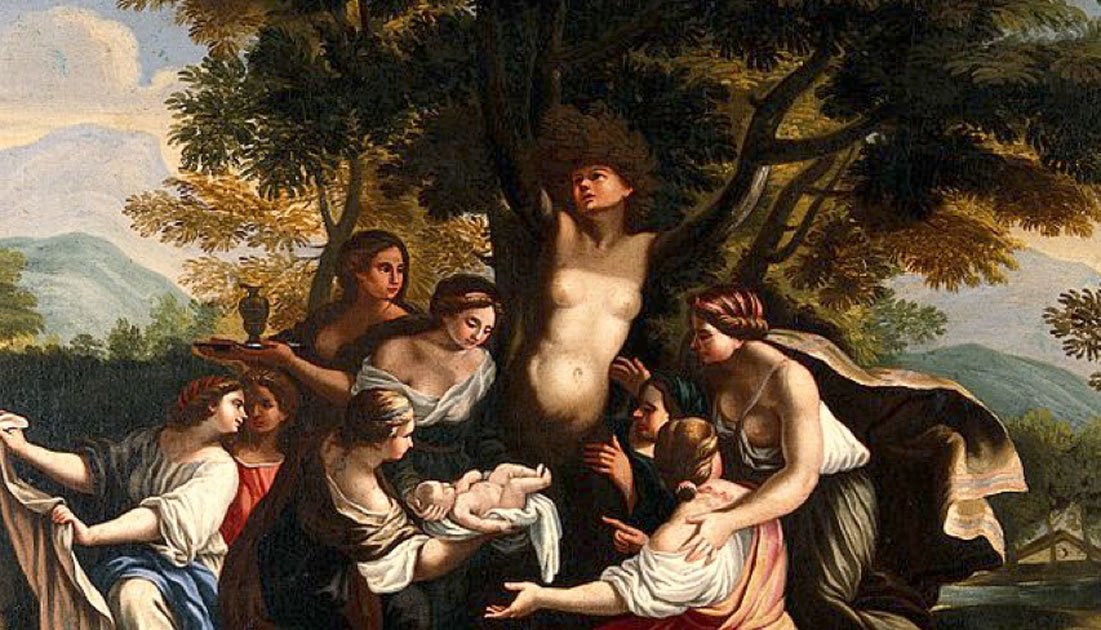Cinyras
In Greek mythology, Cinyras (Ancient Greek: Κινύρας) was a famous hero and king of Cyprus. Accounts vary significantly as to his genealogy and provide a variety of stories concerning him; in many sources he is associated with the cult of Aphrodite on Cyprus, and Adonis, a consort of Aphrodite, is mentioned as his son.
Some scholars have proposed a connection with the minor Ugaritic deity Kinaru(m), the god of the lyre. The city Cinyreia on Cyprus was believed to have taken its name from Cinyras.
Biography
The name Cinyras does not appear again until he is mentioned by Pindar as "beloved of Apollo," and the priest of Aphrodite. Pindar mentions Cinyras as being fabulously rich in Nemean Ode 8, line 18.
Later, in Greek and Roman literature and in the Christian fathers such as Clement of Alexandria, the story of Cinyras is elaborated. They say that on Cyprus, Cinyras was revered as the creator of art and of musical instruments, such as the flute. In one source, he is also noted for his physical beauty.
If Cinyras was the Cinyra, mentioned by Pliny, who was the son of Agriopas and a Cyprian, he was credited to have invented tiles and discovered copper-mines, both of which were found in the island. He was also regarded as the inventor of tongs, the hammer, the lever, and the anvil.
Family
According to the Bibliotheca, Cinyras was a descendant of Eos and Cephalus. His parents were Sandocus, son of Astynous (himself son of Phaethon), and Pharnace, daughter of Megassares (king of Hyria). Cinyras' father, Sandocus was an immigrant from Syria who settled in Cilicia and founded a city Celenderis.
Cinyras upon his arrival in Cyprus with some of his people, founded the town of Paphos and married Metharme the daughter of Pygmalion, the king of Cyprus. His children according to Pseudo-Apollodorus are Adonis and Oxyporos, and also daughters Braesia, Laogora, Orsedice. These maidens by reason of the wrath of Aphrodite cohabited with foreigners, and ended their life in Egypt. Laodice was also called the daughter of Cinyras. She married Elatus, son of Arcas, and had by him two sons Stymphalus and Pereus.

Pausanias mentions a daughter of Cinyras as the consort of Teucer, who is known to have received the kingdom of Cyprus from Belus for having assisted him in the invasion of the island. Her name is not given in Pausanias' account, but Tzetzes writes that Teucer married Eune "daughter of Cyprus".
Stephanus of Byzantium informs us that Cinyras' mother was named Amathousa, and it was either from her or Amathous, a son of Heracles, that Amathous, the oldest city of Cyprus, received its name. Stephanus also mentions three otherwise unknown children of Cinyras: a daughter Cyprus, who had the island named after her, and two sons, Koureus and Marieus, eponyms of the towns Kourion and Marion respectively.
Hesychius says he was a son of Apollo, while Hyginus consistently calls him a son of Paphos (presumably the eponym of Paphos), and a scholiast on Pindar makes him a son of Eurymedon and the nymph Paphia. In other sources he is the husband of Galatea. Cinyras was also called the father of Myrrha.
Mythology
Trojan War
In the earliest testimony for this character in ancient Greek literature (the account of Homer), Cinyras was a ruler on Cyprus who gave a corselet to Agamemnon as a guest-gift when he heard that the Greeks were planning to sail to Troy.
Eustathius in his commentary on this passage relates that Cinyras promised assistance to Agamemnon, but did not keep his word: having promised to send fifty ships, he actually sent only one commanded by the son of Mygdalion, while the rest were sculpted from earth, with figures of men (also made of earth) imitating the crew. He was cursed by Agamemnon and subsequently punished by Apollo, who beat him in a musical contest (similar to that between Apollo and Marsyas, to see who was a better musician with a lyre) and killed him, whereupon Cinyras' fifty daughters threw themselves into the sea and were changed into sea birds (alcyones).

Myrrha
According to Ovid, Cinyras' daughter Myrrha, impelled by an unnatural lust for her own father (in retribution for her mother Cenchreis' hubris), slept with him, became pregnant, and asked the gods to change her into something other than human; she became a tree from whose bark myrrh drips.
From this incestuous union sprang the child Adonis. Cinyras was said to have committed suicide over the matter. Other authors equate Cinyras and Myrrha with king Theias of Assyria and his daughter Smyrna, and relate the same story of them. Hyginus uses the name Cinyras for the father, but Smyrna for the daughter.
Priesthood of Paphian Aphrodite
Clement of Alexandria in his Protrepticus talks about the "Cyprian Islander Cinyras, who dared to bring forth from night to the light of day the lewd orgies of Aphrodite in his eagerness to deify a strumpet of his own country."
In his Histories, Tacitus relates the account of divination rites at the famous Temple of Venus at Paphos; according to traditional tales, this temple was founded by King Aerias, but others say Cinyras consecrated the temple, which was built right on the spot where the goddess had first stepped on the land after her birth from the sea.
Here Tacitus describes him as having come to Cyprus from Cilicia, whence he introduced the worship of Paphian Aphrodite. The divination practices at the temple are said to have been introduced by Tamiras of Cilicia. The office of priesthood became hereditary in the families of both Cinyras (Cinyradae) and Tamiras, but the descendants of the latter were eventually displaced by those of the former; in the times of Tacitus, only the priest of Cinyras' line was consulted.
The footnotes to this story also state that Cinyras is "Another mythical king of Cyprus. Hesychius calls him a son of Apollo, and Ovid makes him the father of Adonis."

Sources
Hyginus, Fabulae, 270
Pliny the Elder. Naturalis Historia, Book 7.56.3
Pseudo-Apollodorus, Bibliotheca, 3. 14. 3; 3. 9. 1 for Laodice
Pausanias, Description of Greece, 1. 3. 2
Servius on Aeneid, 1. 619 - 621
Tzetzes on Lycophron, 450
Stephanus of Byzantium, s. v. Amathous
Stephanus of Byzantium s. vv. Kypros, Kourion, Marion
Hesychius of Alexandria, s. v. Kinyras; also scholia on Theocritus, Idyll 1. 109
Hyginus, Fabulae, 58, 242, 275
Scholia on Pindar, Pythian Ode 2. 28
Ovid, Metamorphoses, 10. 294 - 559 & 708 - 739 Myrrha.
Iliad, 11. 20-23
Eustathius on Iliad p. 87; cf. also scholia on the same passage
Hyginus, Fabulae, 242
Apollodorus, Bibliotheca, 3. 14. 4; Antoninus Liberalis, Metamorphoses, 34
Hyginus, Fabulae, 58
Tacitus. Histories, 2.3
Pindar. Pythian Ode, 2.26
Scholia. ad Theocritus, 1.109.
"Wikipedia"













